
In the latest Master's ranking by the CHE Centre for Higher Education Development, our Master's degree programme in Physics received top marks from students for study conditions. Physics students particularly appreciate the overall study situation and the range of courses on offer.
On 16 February 2026, the symbolic foundation stone was laid for the new physics building at the Technical University of Braunschweig. The new building, costing around 72.4 million euros, will offer physics students and researchers excellent conditions for research and teaching.
The QVLS-iLabs future cluster is entering its second phase and will receive a total of €23 million over the next three years to develop application-oriented quantum technologies in collaboration with 25 partners. Initial successes, such as open-source software for quantum control and quantum sensors for more sustainable battery production, demonstrate the potential of the consortium.
They want to bring light to the world of microelectronics: The state of Lower Saxony and the VW Foundation are providing around €15 million in funding to the Lower Saxony microelectronics consortium ‘Nitride Technology Centre’ (NTC), which is led by the Technische Universität Braunschweig.
Doctoral student Frank Anang from the Institute for Semiconductor Technology has developed brush-like zinc oxide nanowires that generate a voltage of almost 100 millivolts at low pressure via the piezoelectric effect. This could enable tiny implantable biosensors or adaptive pacemakers to be powered autonomously in the future.
On St. Nicholas Day, the Braunschweig Citizens’ Award was presented as is tradition. This year, Adam Kuchnia and Julian Mathis Vondeberg, students from our faculty, were among those honored for their academic achievements and social commitment. We congratulate all the award winners!
In the EU-funded ULTRAPURE project, a team from the Institute of High Frequency Technology is working with partners from the Netherlands, France, and Switzerland to develop innovative chips that generate ultra-pure waves. As one of 42 projects in the European Innovation Council's “Pathfinder Open” funding program, ULTRAPURE could revolutionize groundbreaking key technologies such as the 6G standard and quantum technologies.
On November 13, Lower Saxony's Minister of Science Falko Mohrs presented the Lower Saxony Science Award 2025. Among others, Luca Madita Nieding, who recently completed her master's degree in physics at our faculty, received the award for her student commitment. Congratulations!
The Science and Art Lab at the Technical University of Braunschweig is moving to the main campus. To mark the occasion, author Ulrich Woelk will be reading from his two novels, “Schrödingers Schlafzimmer” and “Freigang” on November 27. Please join us on November 27 at the old building, Pockelsstraße 4, Room 006!
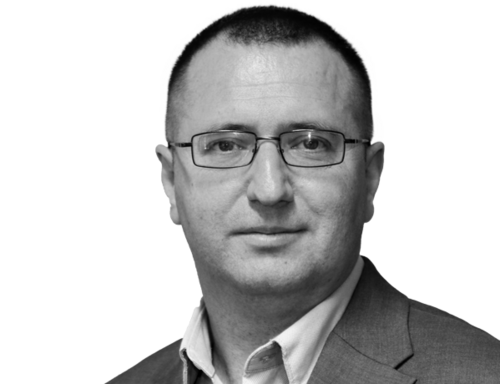
Prof. Oleksandr Dobrovolskiy from the Department of Cryogenic Quantum Electronics at the Institute of Electrical Measurement Technology and Fundamentals of Electrical Engineering will give his inaugural lecture on ‘Cryogenic Quantum Electronics of Fluxons and Magnons’. Please join us on 20 November at 4 p.m. in the auditorium of the House of Science, Pockelsstraße 11, 3rd floor.
The TU Braunschweig and National Yang Ming Chiao Tung University in Taiwan are launching their first joint research partnership with the CryoDot project, in which Professor Vadim Issakov's team from the Institute for CMOS Design is creating central control elements for qubits. Over the next three years, they will be working with around €750,000 in funding from Germany and Taiwan.
On 27 October, lecturers were honoured in five categories for their exceptional commitment. The award for the best lecture went to Prof Tim Figscheidt from the Institute for Communications Technology. Congratulations!
Every semester, the physics institutes of our faculty invite guest lecturers from all over the world to the Physics Colloquium at the Physics Centre. The first dates for the winter semester 25/26 are now online and will be updated on an ongoing basis.
With the ceremonial inauguration of FLYBOTS, the Technical University of Braunschweig and the German Aerospace Centre have created a unique test field for unmanned aerial vehicles in Germany. The Institute for Electromagnetic Compatibility is also involved in the project!
The International Max Planck Research School for Solar System Science (“Solar System School”) will continue indefinitely at the Göttingen and Braunschweig locations. In addition to the Max Planck Institute for Solar System Research and the University of Göttingen, several of our institutes are also involved in the project!
The elenia Institute for High Voltage Engineering and Energy Systems looks back on a hundred years of history. Research and teaching priorities such as insulation testing, the development of switching and rectifier equipment, and high-voltage direct current transmission continue to shape the Braunschweig site to this day.
In the eighth Deep Learning Lab, students created so-called saliency maps to clearly visualize the decision-making processes of AI. Their explanations were tested for human plausibility, actual significance, and computational efficiency, with the latter being awarded an environmental prize.
In a joint project, Prof. Kroker and her team are working with Leibniz University Hannover to develop diamond-based optical resonators that quadruple the frequency stability of precision lasers or require only a quarter of the previous space at the same power. Funded by the German Federal Ministry of Research, Technology, and Space, the project is paving the way for compact quantum technologies.
Yannick Wenger, Prof. Bernd Meinerzhagen, and Prof. Vadim Issakov from the Institute for CMOS Design have developed a novel self-test method for SiGe automotive radar front ends. This work was named one of the most outstanding publications of 2024 and awarded the VDE ITG Prize 2025. Congratulations!
An international research team from our university and the Helmholtz-Zentrum Dresden-Rossendorf has classified the copper mineral atacamite as a magnetocaloric material. At low temperatures, an applied magnetic field causes a significant change in temperature, which could contribute to energy-efficient cooling technologies in the future.
As part of CampusXperience, our institutes also opened their doors and offered fascinating insights into current research projects: From spectacular high-voltage demonstrations to encounters with assistance robot dogs, there was something for everyone.
Dr Leonie Heinze has been awarded the €10,000 Heinrich Büssing Prize 2024 for her dissertation on frustrated magnetic materials - a promising approach to cooling quantum computers. Congratulations to her!
With the approval for another seven years, QuantumFrontiers continues its mission to raise measurements to a previously unattained level at the quantum frontier. We congratulate the team on this great success!
In the HIQEQS project, a highly integrated cryogenic measurement technology is being developed that records quantum signals at -269 °C with extremely low noise and in which both the PTB's Quantum Electronics Department and the Institute for CMOS Design, headed by Prof. Vadim Issakov, are involved.
In the Architecture Pavilion, Prof. Ittel welcomed newly appointed and retiring professors - including those from our faculty - to an interdisciplinary get-together. She made it clear that cooperation, democratic co-design and research with social relevance have a lasting impact on our university.
The autonomous truck developed in the ATLAS-L4 project has proven its practicality on German highways and demonstrates the potential for Logistics 4.0. Among other things, the Institute for Control Engineering has developed concepts for the safe operation of Level 4 trucks and for the technical self-awareness of automated vehicles.
Prof. Daniel Prades has been living in Braunschweig for over a year and is the university's first Alexander von Humboldt Professor. He conducts research at the Institute of Semiconductor Technology - you can find more information about his research in the new article.
Prof. Dr. Jessica Agarwal from the Institute of Geophysics and Extraterrestrial Physics receives follow-up funding on her Lichtenberg Professorship, which paves the way for her to become a lifetime professor and strengthens asteroid research.
On our new subpage “Our students report”, students from our faculty as well as international students share their personal experiences from their stays abroad.
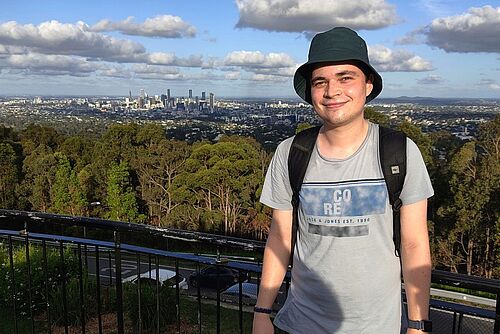
On May 13, 2025 from 10 am to 6 pm, the Future Festival will take place on the Future-Tech:Stage. Find out how artificial intelligence, virtual reality and quantum computing will shape the teaching of tomorrow. Look forward to exciting presentations, interactive workshops and first-class networking opportunities!
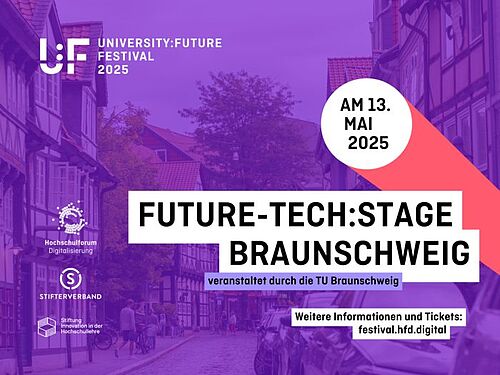
Prof. Eduard Jorswieck, Managing Director of the Institute for Communications Technology, has been elected a member of the National Academy of Artificial Intelligence (NAAI). The Academy thus honors his “pioneering work in the field of physical layer security and contributions to 6G technologies”.
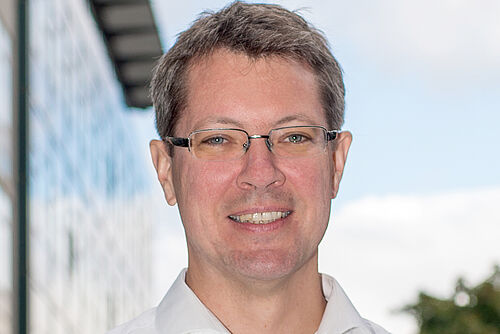
At this Zukunftstag on April 3rd, the elenia Institute for High Voltage Technology and Power Systems an the Institute for Electrical Machines, Traction and Drives gave interested girls an insight into everyday life at the institute. Practical examples were used to demonstrate how crucial electrical engineering is for the energy transition.
Have you just finished your A-levels and are wondering what's next? Immerse yourself in the fascinating world of bioelectronics engineering - a discipline that combines modern electronics with biosciences to revolutionise medicine, the environment, food, fitness and many other technologies!
An interdisciplinary research group from the Institutes of Applied Physics, Communications Engineering and Analysis and Algebra has developed an artificial intelligence capable of analysing images from scanning tunnelling microscopes with an impressive 99% accuracy. This innovative technique enables efficient and precise identification of chiral molecules and could revolutionise basic research.
The most talented young researchers from the region presented their projects at the regional “Jugend forscht” competition in Braunschweig on 28 February.
Prof. Andreas Hördt from the Institute of Geophysics and Extraterrestrial Physics was elected President-designate of the German Geophysical Society (DGG) at the General Assembly in Bochum on February 26 and will assume the office of President in 2027. Congratulations!
How can you levitate superconductors? Can you cook with comets and how does a round of quantum miniature golf work? Pupils were given answers to these questions during hands-on experiments at the Physikinformationstag at the Technical University of Braunschweig. There were also insights into research with lectures on quantum physics and laboratory tours.
The Nobel Prize in Physics honors John J. Hopfield and Geoffrey Hinton for their fundamental contributions to artificial intelligence, which is now present in science and everyday life, for example through ChatGPT. Tim Seifert M. Sc. explains how this technology works and what makes its discoveries revolutionary.
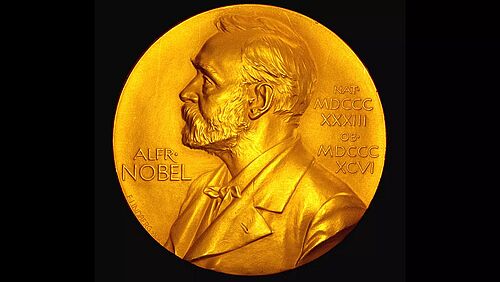
On December 9, 2024, eleven students explored the Institute for Electrical Machines, Drives and Trains as part of the “step in MINT” initiative.
To the report
Professor Stefanie Kroker from the Institute of Semiconductor Technology has been awarded an ERC Consolidator Grant worth almost two million euros for her research project "MightyMirrors". She and her team want to push the boundaries of what is possible with so-called meta-mirrors.
On January 1, 2025, Professor Tim Fingscheidt from the Institute for Communications Technology will be appointed an IEEE Fellow. This special honor is given to Professor Fingscheidt “for contributions to speech enhancement systems and their evaluation”. Congratulations!
The Institute for CMOS Design under Professor Vadim Issakov is involved in the EU project ArCTIC and the BMBF project CryoSoQ. The findings are to become an additional facet of the new Master's programme Quantum Technologies in Electrical and Computer Engineering.
Professor Andreas Waag received the award in the category ‘Scientist at a university in Lower Saxony’. Sarah Koop-Brinkmann was honoured in the ‘Student’ category. Congratulations!
Farsane Tabataba-Vakili has been teaching and researching at the Institute of Condensed Matter Physics since September 2024. In an interview, she talks about her research at TU Braunschweig.
As part of the partnership agreement between TU Braunschweig and the Universidad Nacional Autonóma de México (UNAM), Prof Ferdinand Plaschke and Kristin Pump from the Institute of Geophysics and Extraterrestrial Physics (IGEP) visited Prof Xóchitl Blanco Cano's group from the Institute of Geophysics there.
Let our physics institutes take you on a journey into the fascinating world of physics. In this series of popular science events, you will discover exciting research findings on a wide range of topics. We look forward to your visit!
Finding a charging station with an electric car, unrolling the cable, plugging it in and rolling it up again - that should be easier. Researchers at our Institute for Electrical Machines, Traction and Drives (IMAB) have developed a plate for inductive charging.
On 19 September, astrophysicist Lisa Kaltenegger will be a guest at Technische Universität Braunschweig as part of the Lise Meitner Lectures. Professor Kaltenegger is one of the world’s leading researchers in the search for habitable planets outside our solar system.
The ESA space agency's JUICE satellite mission was launched on 14 April 2023. The Institute of Geophysics and Extraterrestrial Physics (IGEP) was also involved by contributing a magnetic field measuring device. The scientists hope to be able to explore the moons of Jupiter and clarify whether life is possible beneath the surfaces of the moons.
The student Laura Patzke, who is working on her Master's thesis in Professor Wolfram Brenig's group at the Institute of Theoretical Physics, was selected to take part in the 73rd Nobel Laureate Meeting in Lindau on Lake Constance in a highly competitive, international review process. Congratulations!
Climate and polar researcher Markus Rex, head of the MOSAiC Arctic expedition, will give an alumni talk on 25 June 2024 on the topic of "Frozen at the North Pole - Expedition to the Epicentre of Climate Change".
Dr. Lucca Richter was awarded the Rudolf Urtel Prize 2023 for his dissertation at the symposium of the FKTG - Gesellschaft für Elektronische Medien. He completed his doctoral thesis at the Institute for Communications Technology.
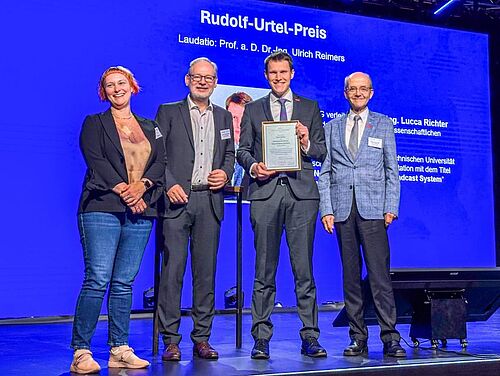
The two students, Isabella Burger and Annika Pischke, traveled to the Arctic Circle together with doctoral student Raphael Schulz and Professor Andreas Hördt. There they carried out geoelectric measurements using methods from the Institute of Geophysics and Extraterrestrial Physics.
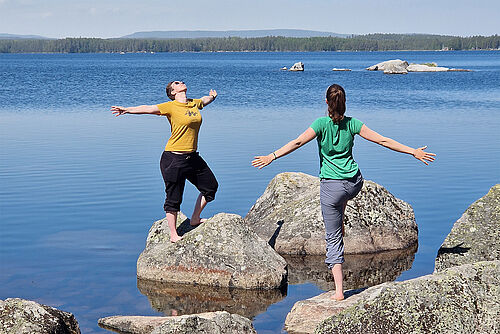
The Voyager 1 space probe, which was launched in 1977, had not sent any usable signals for several months. Contact has now been re-established, which some experts are calling a ‘miracle’. In an article in the Heute Journal, Prof Glaßmeier from the Institute of Geophysics and Extraterrestrial Physics explains why this is so important.
The central alumni*ae platform of TU Braunschweig currently features portraits of five graduates from our faculty. We are delighted that they would like to share their experiences with our current students and graduates.
Under the leadership of Prof Uta Schlickum from the Institute of Applied Physics, the group in the QuantumFrontiers Cluster of Excellence developed a new measurement method. For the first time, a single amino acid in a peptide, a combination of several amino acids, could be identified on a single molecule basis on the surface.
A team of researchers from the Institute of Geophysics and Extraterrestrial Physics of Technische Universität Braunschweig conducted a geophysical study of permafrost bogs in northern Sweden. As well as providing a lot of valuable data, the trip also left some beautiful impressions. Madhuri Sugand, for example, photographed a natural spectacle in the sky – the aurora borealis.
The paper "Safe Usage of Multi-Cores in Neural Network Avionics Application" from the Institute of Data Science and Communication Networks received a Best of Track Paper Award at the Digitial Avionics System Conference (DASC) in Barcelona. Congratulations to all award winners!
Experts from science and industry as well as interested students met at the Haus der Wissenschaften for exciting presentations in the fields of superconductors, direct current technology and hydrogen. A technical exchange at 15 posters rounded off the programme.
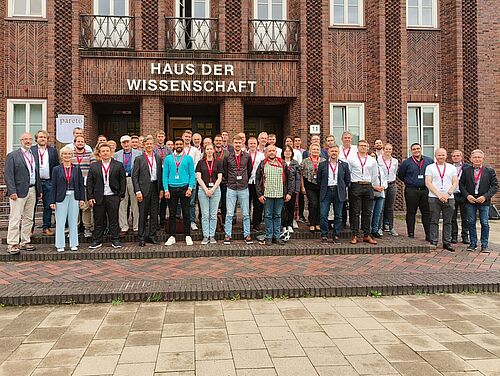
A team of researchers from the IGEP had set off for Abisko in northern Sweden in September 2023 to conduct geophysical studies of permafrost bogs. A special "highlight" was to see northern lights, which offered a little compensation for many a cold working day with their spectacular shapes.
Mjellma Çitaku wrote her Master’s thesis under Prof. Tim Fingscheidt at the Institute for Communications Technology at TU Braunschweig on the topic of “Gelernte Videokompression mit tiefen neuronalen Netzen” (Learned video compression with deep neural networks). Thanks to Mjellma Çitaku, TU Braunschweig succeeded in winning a sponsorship award for the third time.
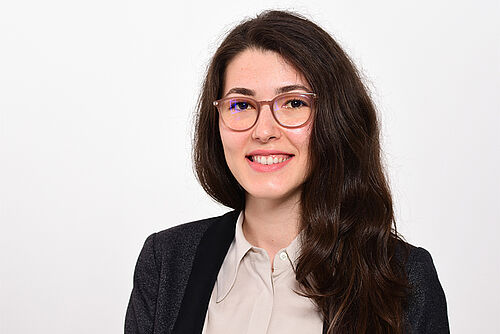
A teaching laboratory has been set up at the Institute for Electromagnetic Compatibility (EMV) to produce teaching videos or to conduct digital courses. It can be used by teachers and students of our faculty.
Especially with autonomous vehicles in mind, it is becoming increasingly important to equip the car's cabin with reliable sensors. In the "SICHER" project, the Institute for CMOS Design led by Professor Vadim Issakov is laying the foundations for a new generation of radar sensors.
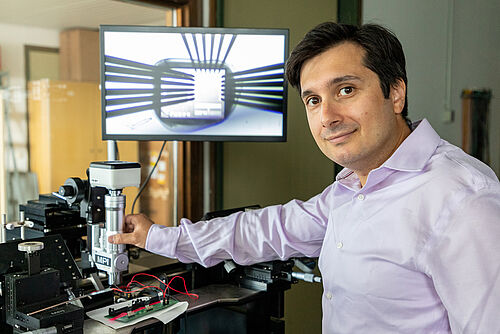
How do you get machines to correctly recognise creatures or objects in images that are unknown to them? This was the question students addressed in the Deep Learning Lab from the Institute for Communications Technology, developing creative solutions.
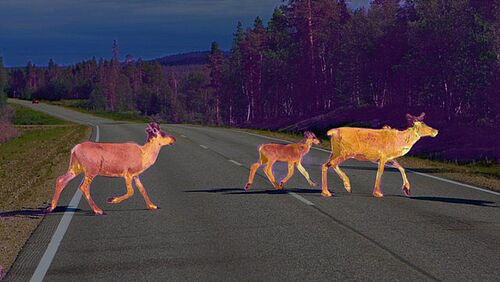
The start-up of the Institute of Geophysics and Extraterrestrial Physics was awarded in the category "Outstanding nominated idea" in the INNOspace Masters, an international competition in the space sector of the DLR.
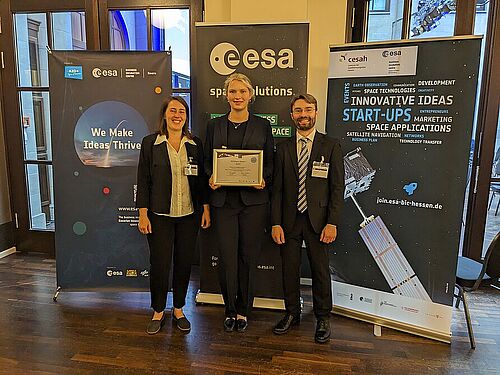
TU Braunschweig welcomes Daniel Prades as their first Alexander von Humboldt Professor. The Spanish expert for nanophotonics receives Germany’s highest-doted research award with five million euros.
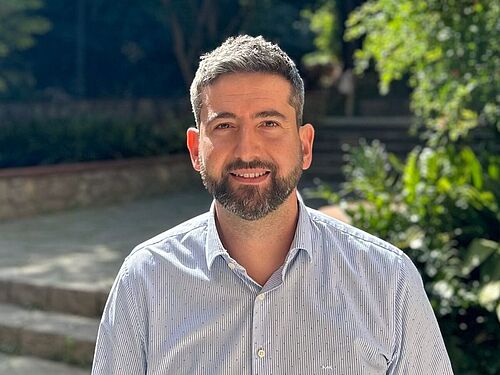
In order to take into account the efficiency and strict reliability requirements in aviation, the Cluster of Excellence SE2A is getting a new laboratory, the Electric Aircraft Ground Lab Environment (E2AGLE). The large-scale research facility will be set up in two subsystems at two locations, at our Institute for Electrical Machines, Traction and Drives and at Leibniz Universität Hannover.
How do you actually work with a quantum computer? The English-language Master’s programme “Quantum Technologies in Electrical and Computer Engineering” (QTEC) opens up the world of quantum technologies to students in a hands-on way. Apply until 15 July!
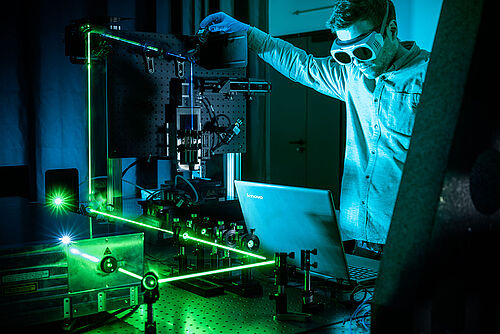
Ready for exciting space missions: The focus of the new Master’s programme Solar System Physics at Technische Universität Braunschweig is the solar system with its planets, moons, asteroids and comets, and with its central star, the sun. Apply until 15 July!
Professor Michael Terörde and Philip Senkpiel from the Institute of Electromagnetic Compatibility together with Johanna Anspach from the Junior Research Group Wiring Technologies of the Faculty EITP participated in a 2-day workshop at our strategic partner university in Glasgow/Scotland, the University of Strathclyde (UoS)".
One week after the launch, the boom on which the magnetometer instrument on the JUICE spacecraft is installed was successfully deployed. One of its sensors was developed at the Faculty of Electrical Engineering, Information Technology, Physics.
Scientists from Harvard University and our faculty's Institute of Condensed Matter Physics have brought together different quantum sensors in a publication. Read more about this exciting field of research.
Peter Toth is a research associate at the Institute for CMOS Design and reports on his seven-month research stay at Keio University in Tokyo. Among other things, he is researching his doctoral topic in the Ishikuro lab. Enjoy reading!
On 14 April 2023 at 14:15, the JUICE mission to explore the planet Jupiter and its moons was launched. The EITP faculty is involved in the European Space Agency (ESA) mission with a self-developed magnetic field measuring device and a camera data processing unit.
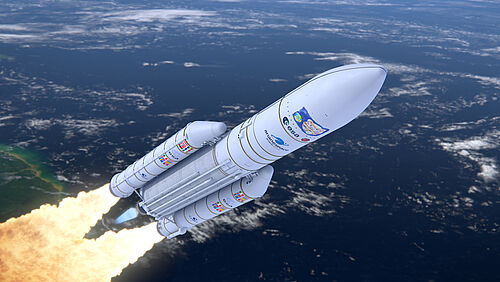
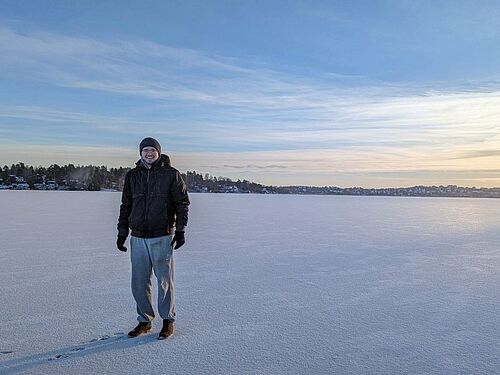
Lars studies physics with a focus on astrophysics at our faculty and is currently completing the Erasmus+ programme at Stockholm University. He particularly enjoys the subject "Observational Astrophysics" because it is very practice-oriented. For example, on an excursion to the Onsala space observatory near Gothenburg, the students were allowed to operate the telescope themselves on two nights and evaluate the data.
After studying physics at our faculty, doctoral student Silvia Müllner is currently researching how light couples better to molecules with a special twist. In the TU Magazine, she reports on her work at the Institute of Condensed Matter Physics.
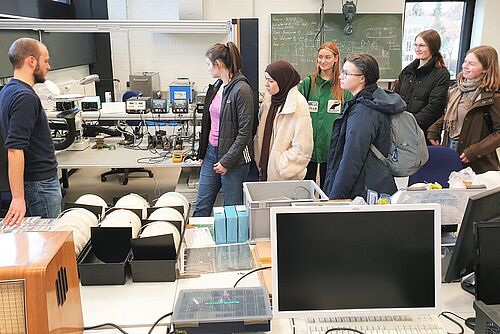
In February, our step in MINT students explored the Faculty of Electrical Engineering, Information Technology and Physics. After a brief overview of the degree programmes offered there, we went to the Institute for Electrical Machines, Traction and Drives – IMAB for short.
To the report
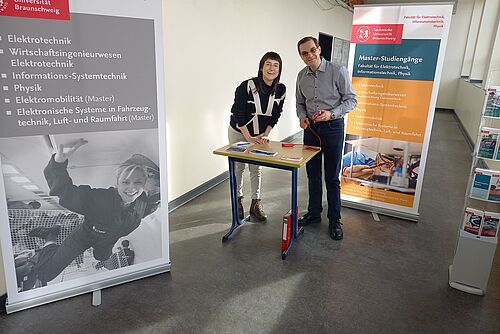
On 9 February 2023, Jörgen Jungclaus from the Institute of Semiconductor Technology and Audrey Bode from the Business Office represented our faculty at the Partner Company Day of the Braunschweig Technology Academy. They answered organisational and content-related questions from students and teachers and invited them to the "Schnupperstudium" in the summer semester.
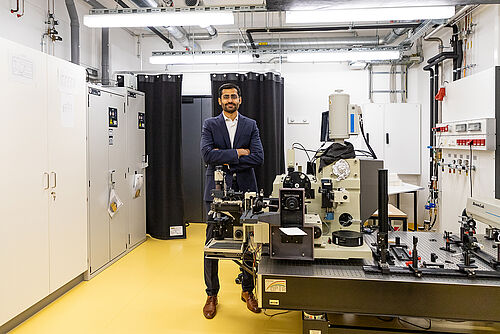
Nabeel Aslam has been a junior professor at the Institute of Condensed Matter Physics since the beginning of October 2022. Most recently, he spent four years at Harvard University researching quantum sensors in diamonds. In the interview, Professor Aslam tells us how he uses individual atoms in the diamond and what inspired him to do science. Have fun reading!
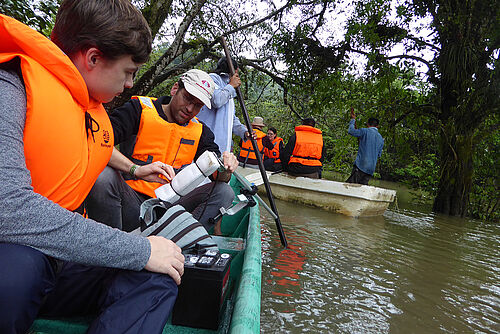
Physics students Bastian Brömer and Ruth Glebe report on their study trip to the karst lakes of the tropical rainforest. Here they are preparing the sonar equipment for the geophysical measurements on Lake Tzibaná. Learn more about the exciting time in Mexico!
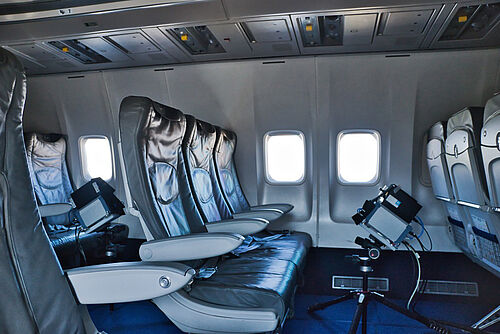
In information technology, the need for fast wireless data communication is growing rapidly. To make speeds of 100 gigabits per second and higher technically possible, a new approach in communications technology is needed. A DFG research group with Prof. Thomas Kürner from the Institute of Communications Engineering as spokesperson is dedicated to this topic.
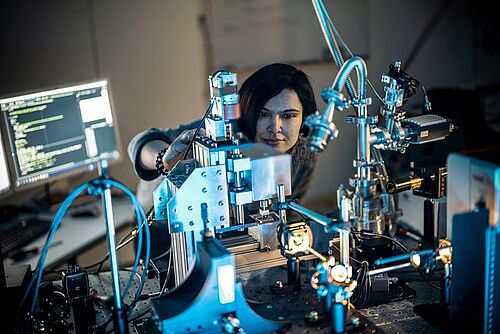
Since January 2018, the Equal Opportunities Working Group (AKC) of the German Physical Society (DPG) has been presenting research by women in physics in Germany and abroad within the "Physikerin der Woche" initiative. In calendar week 45, Prof. Dr. Stefanie Kroker from the Institute of Semiconductor Technology was selected. Her research focuses on micro- and nanophotonic structures that enable light control at scales down to a few nanometers.
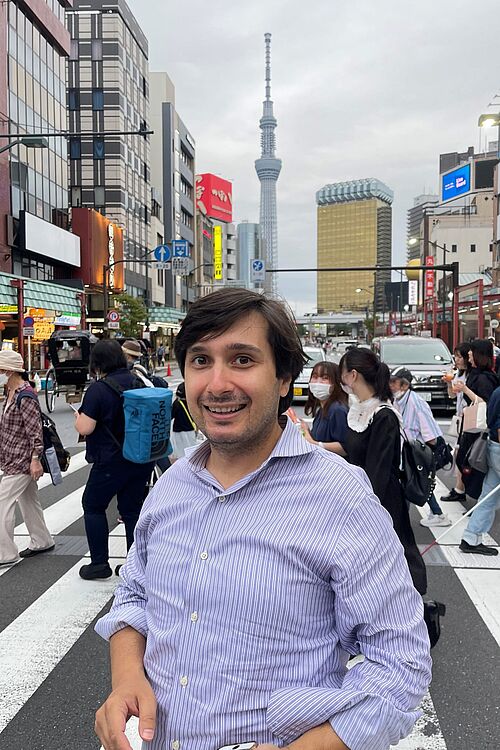
The cooperation between TU Braunschweig and Keio University in Tokyo continued to gain momentum over the summer. First, Professor Vadim Issakov travelled to Japan and lectured on analogue integrated circuits in biomedicine. This was followed by a workshop on “Next Generation Quantum Computing”, which mainly brought together researchers from the Japanese quantum computing programme with those from Quantum Valley Lower Saxony. Finally, Japanese Professor Hiroki Ishikuro returned the visit with a guest lecture in Braunschweig. From enthusiastic students to new cooperation options to exploring Japanese culture: after his German-Japanese summer, Professor Vadim Issakov is positively brimming with impressions.
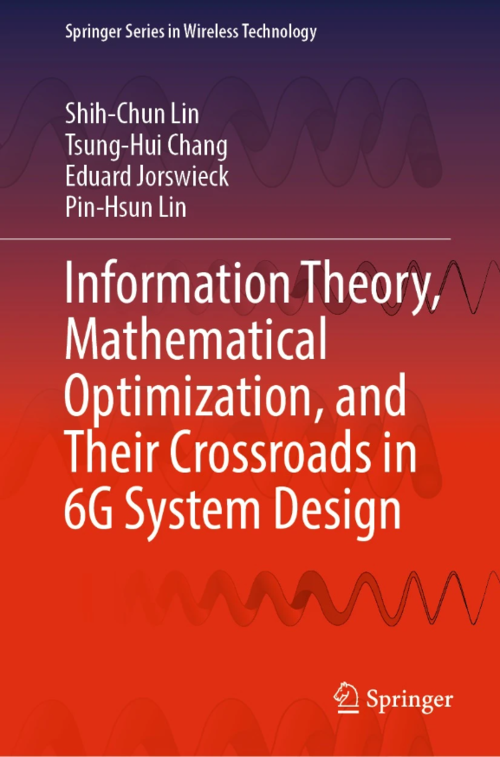
On 21.09.2022, the Springer book "Information Theory, Mathematical Optimization, and Their Crossroads in 6G System Design" with participation of Prof. Jorswieck and Dr. Pin-Hsun Lin from the IuK Group was officially published. Previously, Prof. Kürner and Prof. Fingscheidt had each published a Springer book also during this year, so that in 2022 we can celebrate three Springer books from all groups at the Institute for Communications Technology. A great success!
Information Theory, Mathematical Optimization, and Their Crossroads in 6G System Design | SpringerLink
THz Communications | SpringerLink
Deep Neural Networks and Data for Automated Driving | SpringerLink
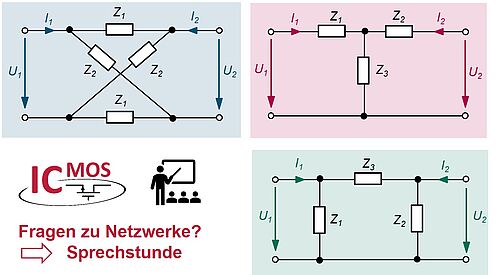
The Institute for CMOS Design offers a consultation hour "Networks" in the winter semester 2022/23 to support you in preparing for the exam. We look forward to seeing you!
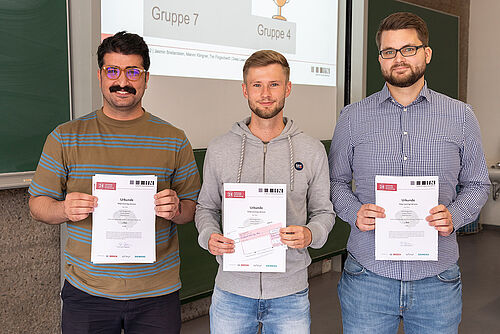
A total of ten teams took on the Deep Learning Lab's task. First place went to Alexander Tank and Sven Brüggemann (both: ELSY) and Morteza Molai (Mechanical Engineering). The additional environmental prize was awarded to Maria Christoph and Lasse Anderes (both: IST) and Leandra Fichtel (Computer Science). Congratulations!
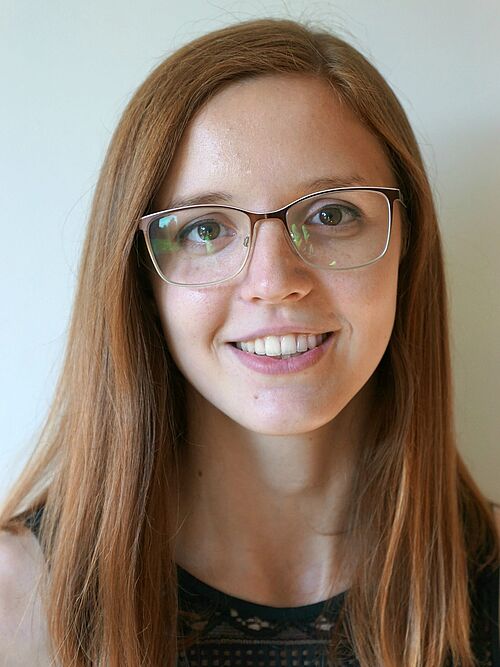
Based on short interviews, members of TU Braunschweig who were the first in their family to attend university introduce themselves. This time: Doro Bischoff, PhD student at the Institute of Geophysics and Extraterrestrial Physics.
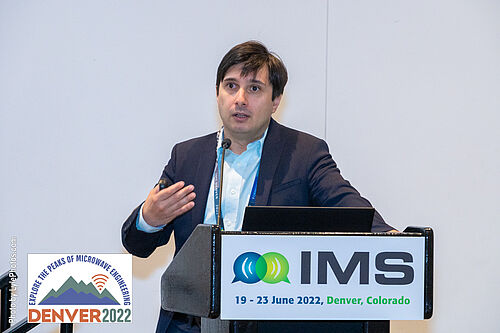
We congratulate Prof. Vadim Issakov from the Institute of CMOS Design for his award as "Distinguished Microwave Lecturer"!
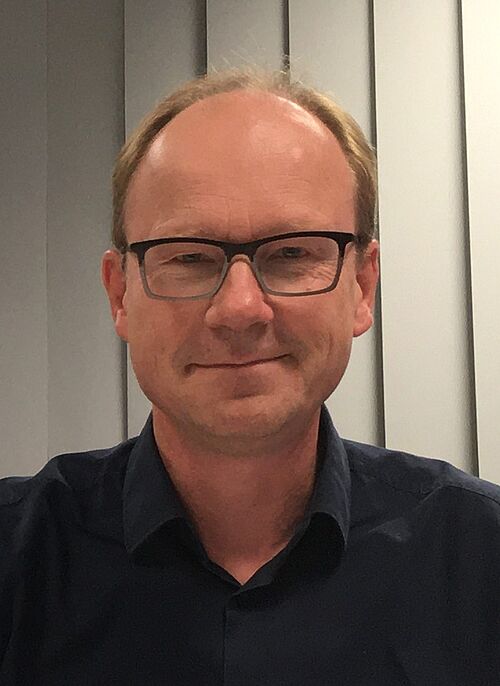
The project Role Models: First Generation Academics at Technische Universität Braunschweig makes social diversity at our university visible. By means of short interviews, various members of TU Braunschweig introduce themselves who were the first in their family to study
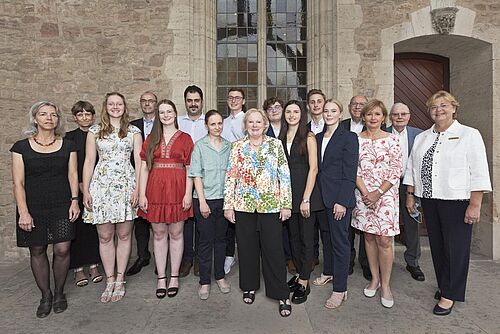
Congratulations to Edona Capric and Leon Götz for their award for outstanding performance!
Prof. Dr.-Ing. Tim Fingscheidt from the Institute for Communications Technology, together with Hanno Gottschalk from the University of Wuppertal and Sebastian Houben from the Fraunhofer Institute for Intelligent Analysis and Information Systems, has published an open access Springer book on automated driving with a focus on "Artificial Intelligence and Data".
This book addresses readers from both academia and industry, since it is written by authors from both academia and industry. Accordingly, it takes on diverse viewing angles, but keeps a clear focus on machine-learned environment perception in autonomous vehicles. Special interest is on deep neural networks themselves, their robustness and uncertainty awareness, the data they are trained on, and, last but not least, on safety aspects. The book is also special in its structure. While a first part is an extensive survey of literature in the field, the second part consists of 14 chapters, each detailing a particular aspect in the area of interest.
From 1 June 2022, you can enrol for our new climate protection bachelor's degree programme "Sustainable Energy Systems and Electromobility". Are you curious?
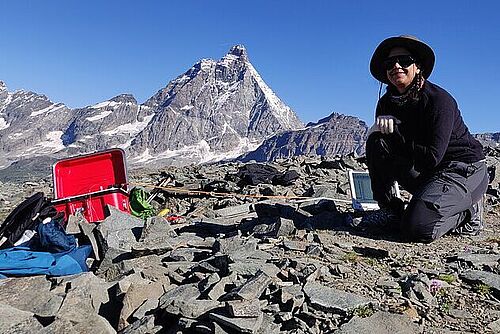
At the annual meeting of the German Geophysical Society (DGG), IGEP members received a downpour of awards. We congratulate Madhuri and her co-authors Andreas Hördt, Johannes Hoppenbrock and Jan Mudler for this award!
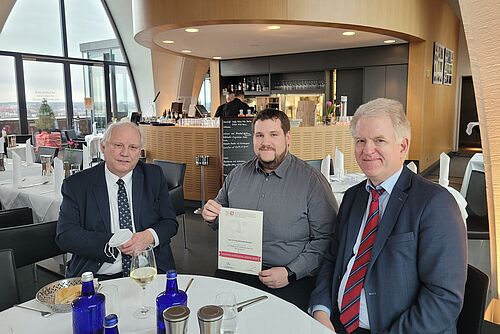
On February 10, 2022, Dr.-Ing. Benedikt Hampel from the Institute for Electrical Measurement Science and Fundamental Electrical Engineering was presented with the Heinrich Buessing Award by the Braunschweig University Association. Due to the pandemic, the award winners of the year 2020 had to wait until February 2022.
IMAB would like to thank all research partners from academia and industry for their support over the past years and hope you enjoy reading it.
After two years, we are reporting as “elenia Institute for High Voltage Technology and Energy Systems” again. Enjoy reading!
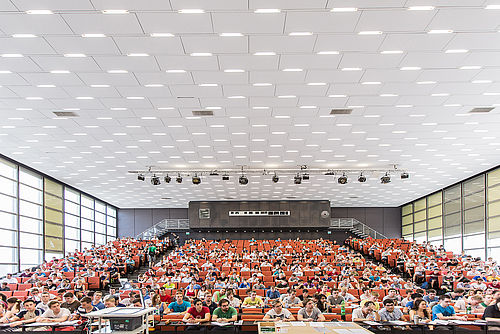
On 13 January 2022, the Lower Saxony state government decided to extend the standard period of study by up to four semesters.
Information from the Admissions Office